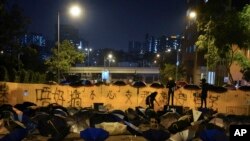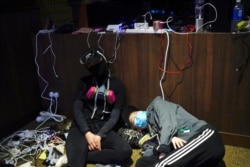Pro-democracy protesters, a number of them students, have barricaded themselves at universities in Hong Kong as the schools become the latest flashpoints in the demonstrators' quest for greater autonomy from China. Violent confrontations between authorities and demonstrators continue to erupt.
In an attempt to quell street protests this week, police entered the Chinese University of Hong Kong, Polytechnic University and the University of Hong Kong, lobbing tear gas inside the first two institutions. That touched off fights at several schools.
The biggest battles raged at the Chinese University of Hong Kong. After police stepped onto campus and arrested several students who were later charged with rioting, the campus transformed into a barricaded encampment. Students, alumni and students from other universities occupied a campus bridge, setting fires and hurling Molotov cocktails, to keep police off campus property. Riot police withdrew Tuesday night. As of late Wednesday, police said protesters were still occupying the campus.
"We have to fight for our freedom. This is not right," said Venus, a 25-year-old CUHK alumna, helping to move resources on Tuesday night. "Police don't have the right to come onto our campus."
Police said they have employed "the minimum necessary force … to assist those in leaving the scene," adding that "multiple warnings have been avoided." Police said they took action after crowds threw bricks, gasoline bombs and launched arrows.
Speaking to the media, police spokesman Kong Wing-cheung said there had been "countless examples of rioters using random and indiscriminate violence against innocent" people. "Hong Kong's rule of law has been pushed to the brink of total collapse as masked rioters recklessly escalate their violence under the hope that they can get away with it," he said.
In a development that has worried many in the city, organizations are helping students from mainland China leave Hong Kong. The city's marine police used a boat on Wednesday to evacuate mainland students from Chinese University. Police said they did so when a mob on campus blocked the students.
In addition, universities have organized shuttle buses and online classes for students who wish to return to mainland China and finish their work. Organizations in the southern Chinese city of Shenzhen invited Chinese students to stay there.
Tensions have been building since last Friday when a student from the Hong Kong University of Science and Technology died after falling one story in a parking garage during a police clearance operation. Alex Chow was believed to be the first student to die in the five months of protests that began over concerns that Chinese law would be applied in Hong Kong, which has a separate constitution. That protest has grown to demand that Hong Kong have more democratic rights and investigate police tactics.
A general strike, called by protesters online, took a dark turn on Monday when a traffic police officer shot and severely wounded a young protester who was joining others to block traffic on Hong Kong Island.
Those actions ignited a growing anger on campuses. At Polytechnic, protesters set trash ablaze, broke windows and tossed chairs and even a fuel bomb onto roads feeding into the Cross Harbor Tunnel. On the window of one campus building, someone wrote, "We will revenge."
The most dangerous battles raged at Chinese University. There, police stepped onto campus in northeast Hong Kong on Monday and arrested five students, then doused a sports field with tear gas as students ran to escape. While university Vice Chancellor Rocky Tuan tried to broker a deal, students demanded that police release those arrested that afternoon, and for police to leave the campus. Police accused students of throwing objects onto the highway below.






